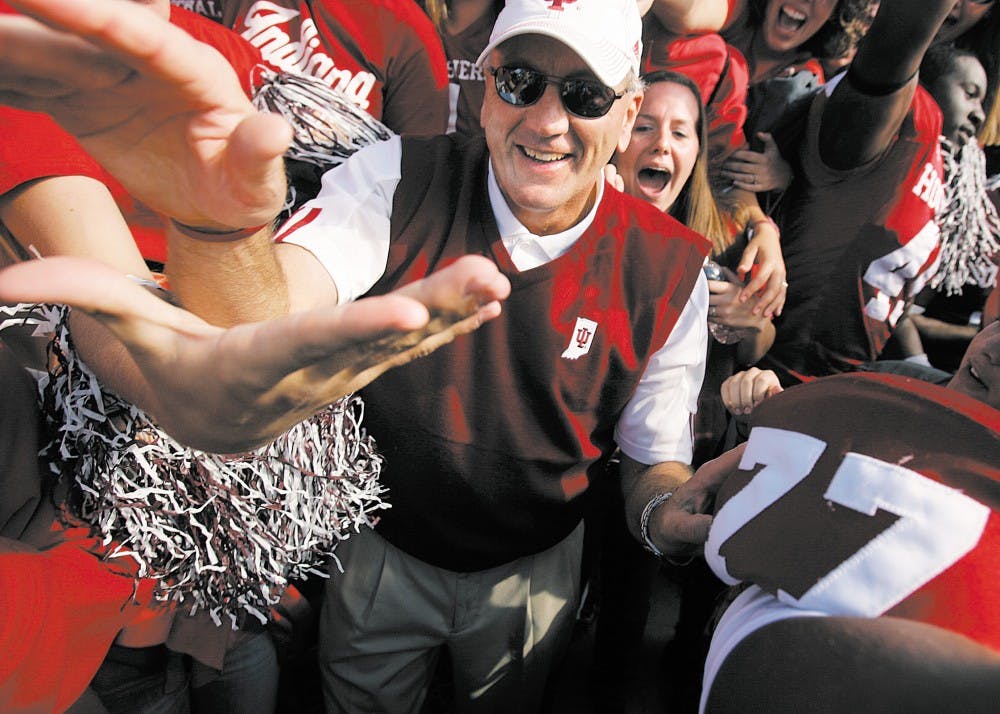Terry Hoeppner was hired as IU football head coach prior to the 2005 season. Hoeppner arrived after five years as the head coach of Miami (Ohio), and once he arrived in Bloomington, he began to change the culture and perceptions about the IU football program.
Through two seasons with IU, Hoeppner was 9-14 as head coach. In March 2007, Hoeppner announced he had brain cancer and was taking a leave of absence. Just three months later, Hoeppner died.
Bill Lynch, who had been serving as offensive coordinator and assistant head coach alongside Hoeppner, took over the team and helped IU snap a 14-year bowl drought with a 7-6 record and an appearance in the Insight Bowl.
The football program honored the 2007 team on Sept. 23 during IU's home game against Georgia Southern. The Indiana Daily Student spoke with members of the 2007 team, including Lynch, to provide a firsthand account of the 2007 season.
Bill Lynch (IU Coach, 2007-10): Terry and I became good friends way back in the late 1970s. I was an assistant coach at Butler University and he was an assistant coach at Franklin College. We played in the same conference back in those days and we spent several weeks each year working summer football camps together. In the mid-1980s to the late 1980s, he went to Miami as an assistant coach and a few years later I went to Ball State as an assistant coach, and we competed against each other for another 10 years.
We used to play golf together and I had great respect for him. He got the job (at IU) and he called me and asked me to come over and be his offensive coordinator. I knew the kind of person he was and the enthusiasm he had and the passion he had. It was too much to say no to.
The first year I thought he did a great job of winning over those players. Sometimes when a new staff comes in, they want their own players, but he took the exact opposite approach. He wanted to win everybody over. I don’t think it took long for the current players in the program to gain great respect for him.
We got done with that first year, felt like we were headed in the right direction, but then that’s when unfortunately he began to get sick. He had his first surgery and was out. He was able to coach during the spring, which was good. We felt like he was really getting his strength back. His passion and enthusiasm never wavered.
Mark Deal (Former IU football player, coach and assistant director of development for IU Varsity Club in 2007): Hep was just a real nice guy. The thing about Terry, when he was the head coach at Indiana, he was the same guy he was when he was an assistant coach at Franklin. He never changed in that regard. He was so big and so full of life.
I think Terry was kind of a breath of fresh air. He was very positive, and I told him that. I think he was part-Bill Mallory, part-Lee Corso.
Hoeppner introduced a variety of new traditions for IU football, including "Hep's Rock," a limestone boulder found on IU's practice field that was installed behind the north end zone at Memorial Stadium.
Dustin Hass (quarterback, 2005-08): It was pretty cool because he did it with a story. He was driving into work one day and it was early morning and the sun was coming up. He said it looked like a big rock. He’s talking about history and Alcatraz and Alcatraz was on a rock. He said when people went to Alcatraz, they didn’t come back. They did hard time at Alcatraz. So he said when it came to play, you did hard time in the rock.
Taylor Donnell (tight end, 2005-08): My initial thought was that this was something that differentiated us from other college football programs. A lot of teams have something very significant that differentiates them from the other teams, and Indiana was lacking that for a very long time.
Deal: He had a little showman in him, obviously, with "The Rock,” which was basically a gimmick to get people to come to the stadium. But what was a gimmick turned out to be much, much more when he got cancer. It became a symbol of his fight against cancer and the rock that he was.
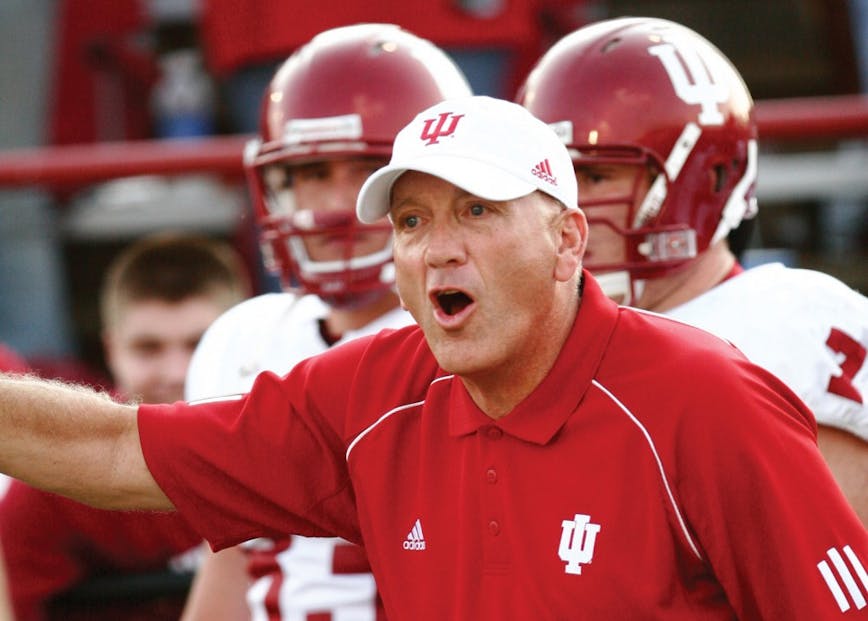
In 2006, Hoeppner's last season, IU jumped out to a 5-4 start before losing its final three games to miss out on bowl eligibility.
Josiah Sears (fullback, 2004-07): The 2006 season, we were really close. We had a couple of games that we really had a great opportunity to win and fell short for whatever reason here or there, and that was kind of the story of our time and probably Indiana football for a long time, unfortunately. But I remember when you’re going into senior year, our group, there’s a great level of focus going into your last year.
Brandon Mosley (defensive back, 2004-08): Throughout that year, we kind of noticed that Coach Hep was going through some things, but we just didn’t know how severe it was. We kind of knew something was up. There was certain things that we caught as players that we just knew were a little out of the ordinary from Coach Hoeppner.
Lynch: We went into that offseason, then by the following spring, the doctors thought (Hoeppner) needed to take a break and get his strength back. So he missed that spring practice leading up to 2007.
On June 15, Lynch was announced as interim head coach for the 2007 season. Four days later, on June 19, Hoeppner died.
Sears: I’ll never, ever, as long as I live, forget the morning they told us. We had literally just got done with a 6 a.m. workout at Memorial Stadium. Some guys were lifting, some guys were getting ready to go to summer school, and a couple of the graduate assistants came out and said we were having a team meeting. And you knew as soon as they said it. Because we never had team meetings in the summer, we weren’t allowed to talk about football in those days in the summertime. You just knew.
Mosley: It was something that a bunch of 18- to 23-year-olds were experiencing for the first time, and through that type of adversity and that type of situation it brought our team together, made us even closer than what we were at the time. Because we knew – it was something that happened, it was unexpected, but we knew that like, "Hey guys, it’s real now." We’ve lost a major piece to our team, the guy who basically led the ship, but if it was up to him, he would want us to keep pushing on.
Deal: It was a trying time. Terry died in June, there was a funeral, it was very traumatic for everyone. It was a tough time for the whole university community, not just football. Terry had kind of transcended that. He was very popular within not just the athletic department, but the whole university.
The June 27, 2007, edition of the IDS, which featured coverage of the Celebration of Life for former IU Coach Terry Hoeppner.
Hass: It brought us together more than anything. Coach Hoeppner was the definition of a player’s coach. Everybody loved Coach Hoeppner. To lose him like that, at first it was a shock and I think everybody got closer, they bonded together. You had a common thing to rally around.
Donnell: We had the same coaching staff, it was all the guys (Hoeppner) brought in with him. They all shared his same mission, vision and values, and really instilled those within the team and organization and with the community as a whole. The transition from him to Bill Lynch was pretty seamless to be honest.
Lynch: I don't think anything changed because we all believed in what we were doing and the direction Coach Hep had taken us. We were just following through with his plan. We banded together, so to speak, had a good preseason camp and led into the season.
Under Lynch's leadership, IU won its first three games of the 2007 season and five of its first six.
Hass: (Lynch) handled it really well. He never brought the attention on himself or anything. It was, “we’re doing this for Hep.” He’s an awesome football coach and an awesome person. To be able to hold a team together through a tragedy like that says a lot about him as a person, as a football coach.
Deal: I don’t think Bill Lynch gets nearly enough credit for coaching that team through 2007 and taking us to a bowl game. I’m not just talking about what went on between the white lines on the field, I’m talking about emotionally keeping that team together. Bill Lynch did an amazing job that year, especially knowing that he had a one-year contract.
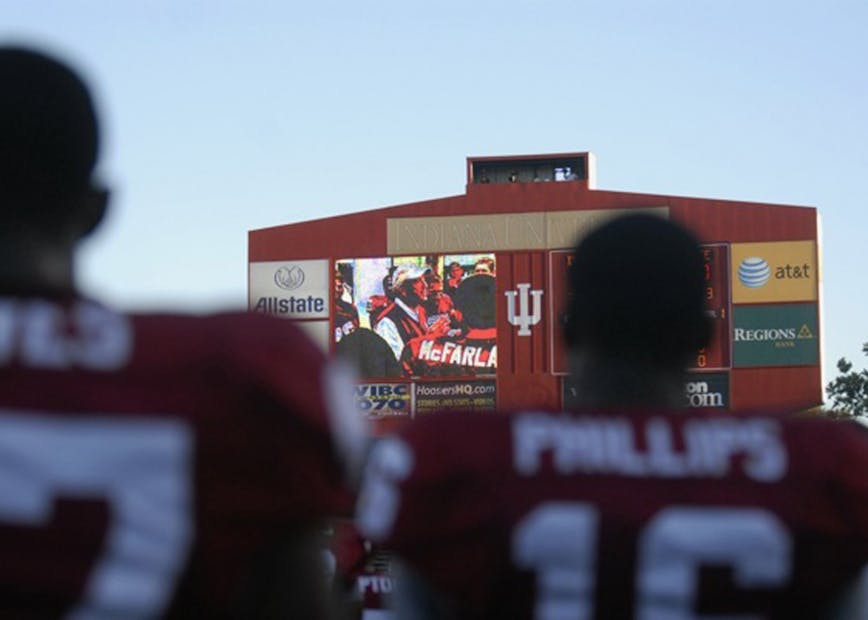
Mosley: We just knew that it’s a long season and we just had to stay focused and go one week at a time, one day at a time. Coach Hep used to always say, “Have a plan, work the plan and plan for the unexpected.” So that was always in our minds, it was a part of our plan, we worked the plan and we planned for the unexpected.
Sears: It felt like we were a good team, as good as we’d been certainly in the time that I was there. My biggest memory of that season is just we kept going and felt like it was going to happen finally. We were going to get that monkey off our back, and we never really doubted that.
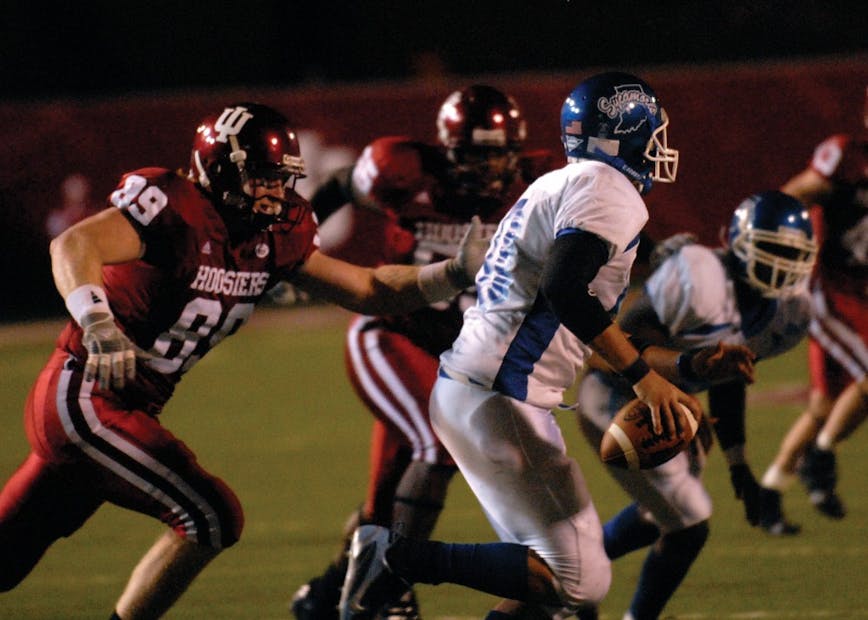
Lynch: I don’t think I’ve ever been around a group that rallied around a cause quite like that group. It wasn’t any one person, it was from top to bottom. I really think the fourth and fifth-year seniors, really led it. That was a great group of guys. They could have just finished their careers out, you know, but they didn’t. There was a passion. That "Play 13" mantra (play 12 regular season games and one postseason bowl game) was something that Coach Hep started from day one.
After losing three games in a row to Big Ten opponents, IU beat Ball State at home to reach six wins and achieve bowl eligibility. However, it became clear that there would not be enough spots for all teams with six wins to earn a bowl berth that season. IU's final two games were at Northwestern and home against Purdue.
Lynch: I think we felt like we had to get seven. We didn’t want to leave it to chance to some bowl committee somewhere if they wanted a six-win team or a seven-win team. There weren’t as many bowl games then as there are now. We really felt like we needed to get that seventh win. We played a really close game at Northwestern. We had a long touchdown pass called back. It was a close call, could have gone either way. I remember traveling back to Bloomington knowing that it was going to come down to the Purdue game.
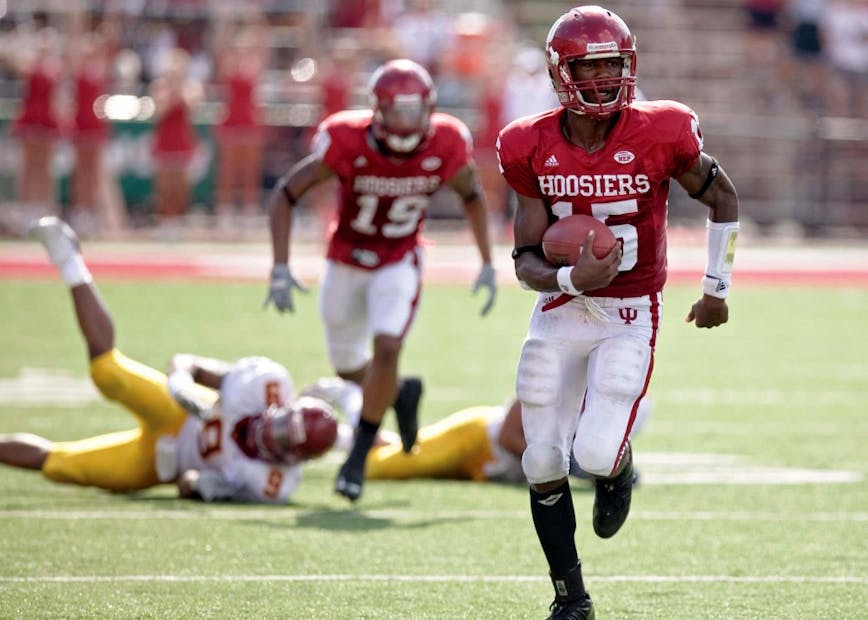
Deal: Bill Lynch had Jane Hoeppner (Terry's widow) talk to the team on Monday or Tuesday of that Purdue week, and Jane talked to the team like Terry would, like a coach. She talked about preparing to win. It wasn’t a ‘win one for Hep.’ Jane talked like a coach.
Donnell: I just remember the buzz and the excitement. I remember Monday afternoon, I could not wait until Saturday came. That week, we blared hype music (in practice) essentially the entire time because the stadium was going to be loud.
Mosley: That definitely is the top game of my Indiana University career emotionally and as far as an all-out, just, brawl. From the very first kickoff – I believe I got that first tackle – it was on. If you watch the game, you can tell, the game was intense the whole game, back and forth, battling back and forth. It was a battle each and every down, it was no plays off and our whole team had one goal in mind – to get that seventh win and play 13.
IU raced out to a 24-3 over Purdue lead early in the third quarter. The Boilermakers then scored 21 consecutive points to tie the game at 24-24 with 3:39 left in the 4th quarter. IU sophomore quarterback Kellen Lewis led a 12-play, 45-yard drive and junior kicker Austin Starr took the field for a go-ahead 49-yard field goal attempt with 30 seconds to go in the game.
Hass, the holder on Starr's kick: I was pretty nervous. Everybody was pretty nervous. I remember the drive before Starr missed (from 42 yards), which, he was pretty much automatic from that distance. The snap was great, my role was just to get the ball and get it down, and he'll make it, and he did.
Donnell: I was on the field for that, and so obviously to be out there and feel that pressure and to watch it go through, and just to hear, it was pretty much like a blackout for 10 seconds. I don’t even remember what I did but it was super exciting. I walked into the locker room without a helmet, someone snatched it out of my hand after the game, but I was so excited I didn't care.
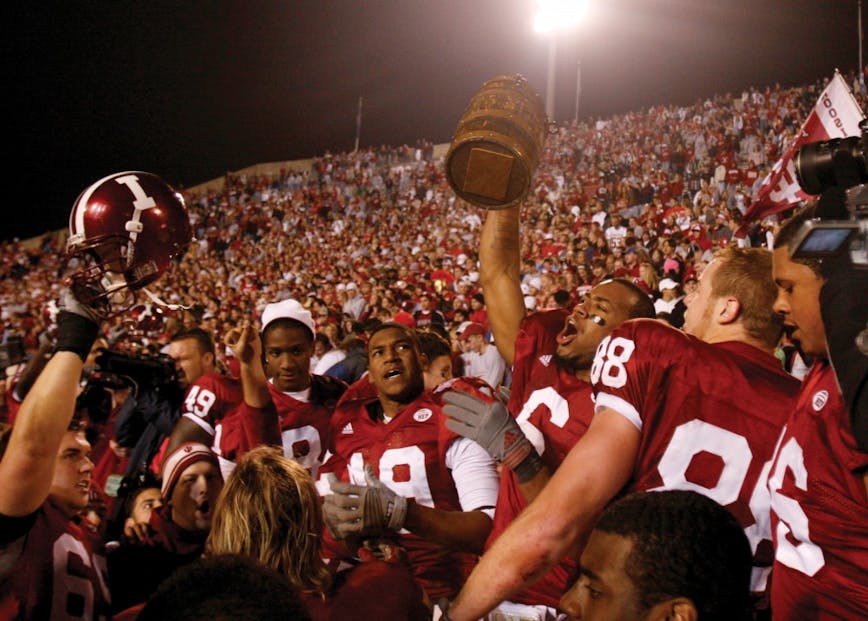
Sears: I wish I remembered it better, I got a concussion in the second quarter, but I’ve seen the video quite a bit so I have some memories of it. It had been a long time since we’d been to a bowl game, and to get the opportunity to get to beat Purdue for the first time in our career — because we had been 0-4 to that point — it had a movie or magical element to it that was pretty cool.
Lynch: A lot of it runs together, like a lot of big games in your career. The excitement, the fans, it was important to a lot of people. They wanted it really bad, and they went out and got it. We had to go out and win it, and those kids did. If you were there, you’ll always remember.
After finishing the regular season 7-5, the Hoosiers received an invitation to the Insight Bowl, which IU lost to Oklahoma State 49-33. It was the first bowl appearance for IU since 1993, and would be the last until the 2015 season. The 2007 Hoosiers are still the last IU team to win at least seven games.
Donnell: The whole thing was fun. The first couple nights (in Tempe, Arizona) the coaches let us go out on the town a little bit. That was special as a team, to come together and celebrate this accomplishment. One final time, as that group together, which was the team to get IU to a bowl game for the first time in a very long time.
Sears: I scored a touchdown. I got in a lot of trouble after that, because I popped up and threw the ball to my girlfriend in the bleachers (and received a 15-yard penalty). She's my wife now, and my son actually sleeps with that football. But the coaches were not pleased with me at that point. I got a little boy that I can put an Indiana jersey on and he can sleep with that football and a wife who is really happy with the deal, so it worked out for me, but my coaches were mad about the 15 yards.
Mosley: It hurt because we lost, but that one loss doesn’t define our season. Just by us making it there was our main goal. Ultimately we wanted to win of course, but we knew once we made it there that it would give the rest of Hoosier nation and future recruits excitement about the program. I felt like we created a movement.
Lynch: I think it's important because it’s part of IU football history. In a bigger way, Hep, for a short period of time, he was the personality of IU football. There was a buzz to him, his personality and the television commercials. Everybody jumped on board. For that group to achieve his first goal, it was important.
It’s interesting too because I know (current IU Coach) Tom Allen so well, he has a lot of that same passion and enthusiasm as Hep had. He's an Indiana guy, he gets to be the head coach of IU football. There’s a lot of similarities there, there really are.
It’s always important to know our history and I think it’s fun to be able to celebrate what we did.

